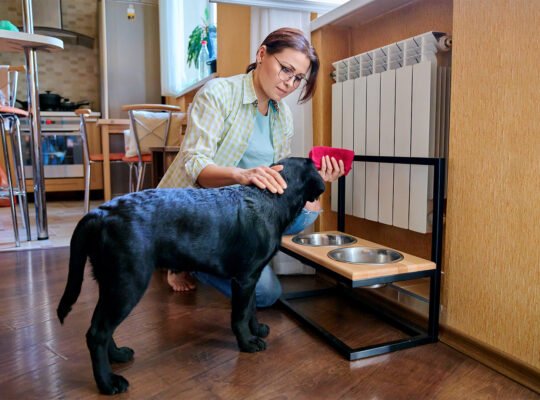Nutrition and Health for Dogs: A Comprehensive Handbook
Excerpt: Discover the key aspects of dog nutrition and health in this comprehensive handbook. From understanding their dietary needs to preventing common health issues, this guide provides valuable information for maintaining your dog’s well-being. Equip yourself with the knowledge to make informed decisions about their nutrition, healthcare, and overall quality of life.
Introduction
Proper nutrition and health are vital for the overall well-being and longevity of your dog. Understanding their dietary needs, common health concerns, and preventive care measures are essential for providing optimal nutrition and healthcare. With the right knowledge and practices, you can ensure that your canine companion leads a healthy, active, and happy life.
In this comprehensive handbook, we will delve into the world of dog nutrition and health, covering topics such as dietary requirements, nutritional considerations, common health issues, preventive care, and tips for maintaining their overall well-being. Armed with this knowledge, you will be empowered to make informed decisions regarding your dog’s nutrition and healthcare.
Understanding Dog Nutrition: Essential Dietary Considerations
- Nutritional Requirements:
- Learn about the fundamental nutrients dogs need, including proteins, carbohydrates, fats, vitamins, and minerals.
- Understand the importance of balanced nutrition and how to choose high-quality dog food that meets their specific dietary needs.
- Feeding Guidelines:
- Establish a feeding routine and portion control to maintain a healthy weight for your dog.
- Consider factors such as age, size, activity level, and breed when determining the appropriate amount of food to provide.
- Special Dietary Considerations:
- Explore dietary options for dogs with specific needs, such as puppies, senior dogs, or those with food sensitivities or medical conditions.
- Consult with your veterinarian for personalized dietary recommendations.
Common Health Concerns and Preventive Care
- Vaccinations and Preventive Measures:
- Understand the importance of vaccinations and regular preventive treatments for common parasites, such as fleas, ticks, and heartworms.
- Follow a vaccination schedule recommended by your veterinarian and maintain a year-round preventive care routine.
- Dental Health:
- Learn about the importance of dental care and how to establish a dental hygiene routine for your dog.
- Regularly brush your dog’s teeth, provide dental treats or toys, and schedule professional dental cleanings as recommended.
- Weight Management:
- Maintain a healthy weight for your dog to prevent obesity-related health issues.
- Monitor their food intake, provide regular exercise, and consult with your veterinarian for guidance on weight management.
Common Health Issues and When to Seek Veterinary Care
- Recognizing Signs of Illness:
- Familiarize yourself with common signs of illness in dogs, such as changes in appetite, behavior, energy levels, or the presence of unusual symptoms.
- Trust your instincts and consult with your veterinarian if you suspect any health issues.
- Allergies and Skin Conditions:
- Understand common allergies and skin conditions in dogs, such as food allergies, environmental allergies, or dermatitis.
- Work with your veterinarian to identify triggers and develop an appropriate treatment plan.
- Joint and Mobility Issues:
- Learn about common joint problems and mobility issues in dogs, such as arthritis or hip dysplasia.
- Discuss preventive measures, management strategies, and treatment options with your veterinarian.
Frequently Asked Questions (FAQs)
Q: Can I feed my dog a homemade diet?
A: Homemade diets can be an option, but it’s crucial to ensure they meet all the nutritional requirements. Consult with a veterinary nutritionist to develop a balanced and appropriate homemade diet for your dog.
Q: How often should I take my dog to the veterinarian?
A: Regular veterinary check-ups are essential for preventive care. Generally, annual wellness exams are recommended, but more frequent visits may be necessary for puppies, senior dogs, or those with specific health concerns.
Q: What are the signs of a healthy diet for my dog?
A: A healthy diet is reflected in your dog’s overall well-being. Look for signs such as a healthy coat, appropriate weight, good energy levels, and regular bowel movements.
Q: What are some natural ways to promote my dog’s health?
A: Providing regular exercise, mental stimulation, a balanced diet, and plenty of fresh water are natural ways to support your dog’s overall health. Additionally, maintaining a safe and enriching environment is crucial.
Nurturing Your Dog’s Nutrition and Health
In conclusion, proper nutrition and healthcare are essential for your dog’s overall well-being. By understanding their dietary needs, implementing preventive care measures, and being proactive in recognizing and addressing health concerns, you can provide the best possible care for your beloved canine companion.
Remember, every dog is unique, and their specific needs may vary. Consult with your veterinarian for personalized advice and always prioritize their well-being. With your dedication and care, you can ensure that your dog leads a happy, healthy, and fulfilling life.
















